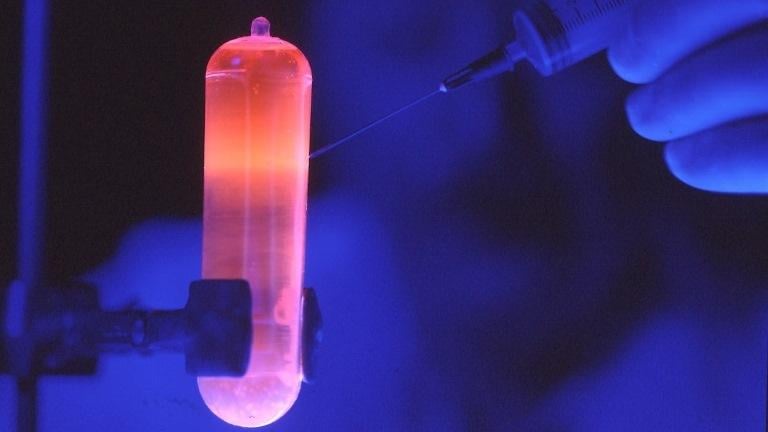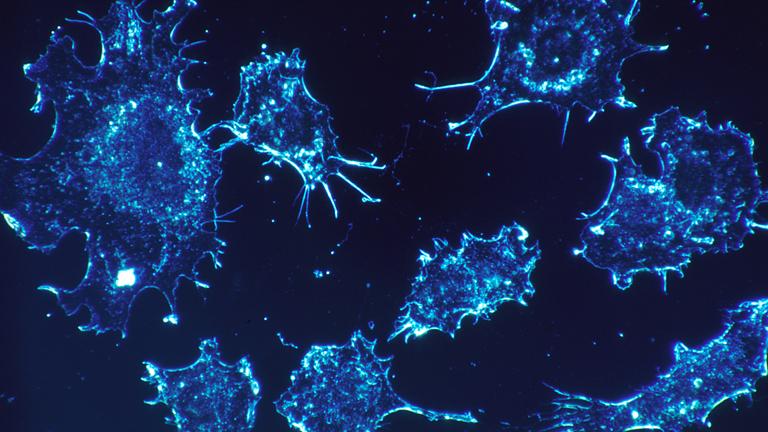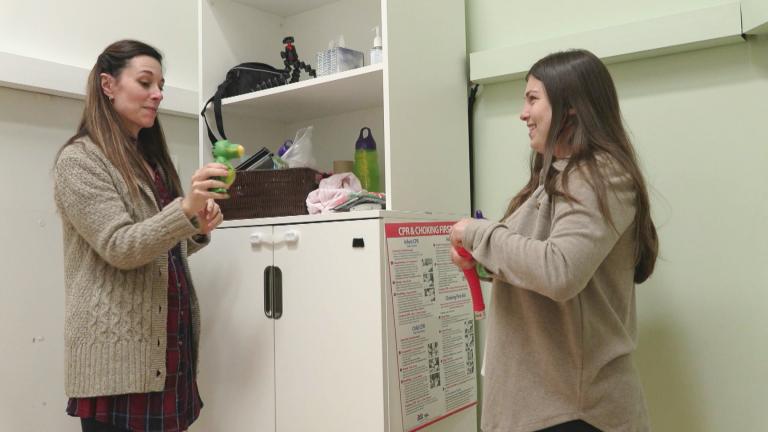 (Mike Mitchell / National Cancer Institute)
(Mike Mitchell / National Cancer Institute)
Northwestern University scientists believe they may have found the “Achilles’ heel” of cancer. In a recent study, researchers were able to almost completely eradicate the disease in laboratory cell cultures.
“There’s a big difference between cell cultures and humans,” said Vadim Backman, a senior author of the study and biomedical engineering professor at Northwestern University, in a statement. “You never know how the environment inside the human body will affect cancer’s behavior or if there will be unforeseen side effects. But, having said that, in seven different types of cancer, we see the same story unfold each and every time.”
The treatment works by altering chromatin, a group of macromolecules – including DNA, RNA and proteins – that contains genetic information within cells and determines which genes get expressed or suppressed. In cancer cells, chromatin can regulate the ability to adapt to treatment and even become resistant to treatment.
With that in mind, researchers altered chromatin’s structure in such a way that prevented cancer cells from evolving to withstand treatment, making cancer an easier target for existing drugs, such as chemotherapy.
Found in cells, chromatin is packed together at different densities throughout the nucleus. Scientists discovered the more heterogeneous and disordered the chromatin packing density was, the more likely cancer cells were to survive – even with chemotherapy. However, the more ordered and conservative the chromatin packing density was, the more likely the cancer cells would die from treatment.
“Just by looking at the cell’s chromatin structure, we could predict whether or not it would survive,” said Backman. “Cells with normal chromatin structures die because they can’t respond; they can’t explore their genome in search of resistance. They can’t develop resistance.”
Scientists discovered they could adjust the chromatin packing density through two FDA-approved immunological agents already on the market that are prescribed for arthritis and heart conditions, respectively, which both happen to have a side effect of altering chromatin packing density.
Backman combined these compounds, which he called “chromatin protection therapeutics,” or CPT compounds, with chemotherapy to treat seven different types of cancer in cell cultures.
“Within two or three days, nearly every single cancer cell died because they could not respond,” Backman said. “The CPT compounds don’t kill the cells; they restructure the chromatin. If you block the cells’ ability to evolve and to adapt, that’s their Achilles’ heel.”
By altering chromatin packing densities, researchers can control the overall behavior of biological systems.
“Think of the number of mutations that have been documented in cancer. We’re talking about thousands,” Backman said. “Just changing one gene is not going to give you cancer, and it’s not going to cure cancer either. But we can rewrite the software by using chromatin engineering to manipulate the genetic code.”
“This work helps establish how the physical environment within the cell nucleus shapes gene expression patterns for many genes simultaneously,” said Luay Almassalha, a graduate student in Backman’s laboratory and first author on the paper, in a statement. “Analogous to how the organization of a city shapes the collective behavior of thousands of people, the physiochemical rules of chromatin that we uncovered govern the collective behavior of the genome.”
While the results and potential applications for the treatment are promising, researchers say more studies are needed. The treatment is now undergoing studies in an animal model.
Contact Kristen Thometz: @kristenthometz | [email protected] | (773) 509-5452
Related stories:
 Northwestern Scientists Discover Molecules Capable of Killing Cancer
Northwestern Scientists Discover Molecules Capable of Killing Cancer
Oct. 19: “Our research may be tapping into one of nature’s original kill switches, and we hope the impact will affect many cancers,” said Northwestern scientist Marcus Peter. “Our findings could be disruptive.”
 Study: Vessels that Spread Cancer Can Also Boost Immunotherapy
Study: Vessels that Spread Cancer Can Also Boost Immunotherapy
Sept. 15: University of Chicago researchers have discovered that lymphatic vessels, which are often blamed for enabling cancer to spread, can also boost a type of cancer treatment.
 ‘Chemo Brain,’ Fatigue Reduced by Physical Activity, Study Finds
‘Chemo Brain,’ Fatigue Reduced by Physical Activity, Study Finds
July 26: “The message for cancer patients and survivors is: get active,” said researcher Diane Ehlers. “It’s not a magic cure-all, but we’ve seen many benefits of physical activity for cancer patients and survivors.”








